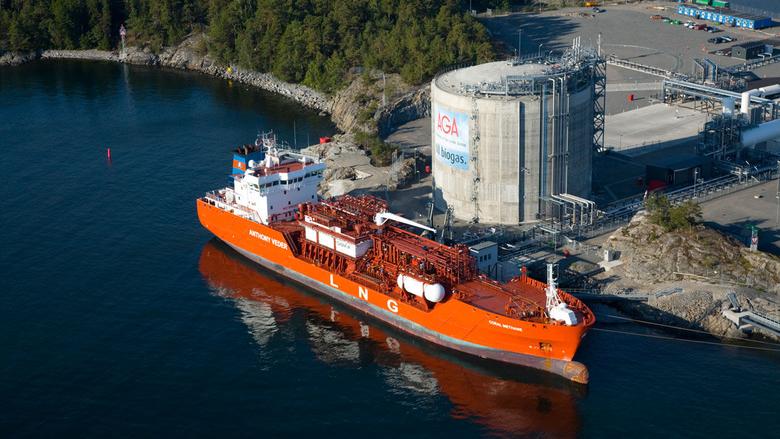
LNG WILL GROW

When the first US export shipment of liquefied natural gas leaves the US Gulf Coast later this year, gas trading will fulfil its long-held promise of going truly global.
Cheniere Energy's Sabine Pass terminal in Louisiana is expected to ship its first LNG tanker around December, bringing US shale gas to world markets at a time when trading of the super-cooled fuel is picking up.
LNG is expected to surpass iron ore as the second most valuable physical commodity after oil this year, according to analysts at Goldman Sachs, who predict it will top $120bn.
This has mobilised commodity traders who have been positioning themselves for increased trading activity and a move towards more LNG contracts being based on current price of gas, known as the spot price.
Up to now, the majority of LNG contracts have been priced over crude oil. But Cheniere plans to use a pricing formula linked to the Henry Hub US natural gas benchmark price, in an example of the weakening hold of the oil-indexed contracts over the market.
Fewer deals may be structured for a long period of time, say a decade or more, as supplies increase and as the price of LNG moves away from being linked to that of oil.
"It is not going to happen overnight but [trading] volumes will build up over the next few years," said David Thomas, head of LNG trading at Vitol, one of the world's largest independent commodity traders.
"The availability of US exports will ultimately influence prices around the world."
Analysts say spot or short-term deals already account for 30-35 per cent of the overall market, though this includes any deals with a duration of less than four years — illustrating how focused the LNG market has been on longer-term deals over its 51-year history.
Even though producers need to lock-in contracts to fund the construction of multibillion-dollar liquefaction and loading terminals, consumers' appetite for oil-linked contracts has fallen even after the near halving in crude prices since last summer. Natural gas prices in the US have been lower for years.
Goldman Sachs forecasts LNG spot prices for delivery into Asia will be about 40 per cent lower in the fourth quarter of 2015 than during the same period last year.
The prospect of US exports and a surge of supplies from Australia will increase global LNG supplies by half over the next four years to about 150bn cubic metres, according to analysts, outstripping slower demand growth in Asia, pressuring prices further.
The oversupply in the market will mean some of the biggest players in LNG will have to increase their focus on trading to help boost profitability, while independent dealers without access to their own production should see increased opportunities.
Shell's £55bn deal to buy BG Group will create by far the biggest force in the LNG market as a supplier and trader.
Swiss commodity house Trafigura, which says it is the world's largest independent trader of LNG, has already signed a number of short-term deals with Egypt and Argentina this year. Vitol, one of the longest-serving independent traders in the market has also been active in supplying Egypt, and delivered more than 1m tonnes of the fuel globally last year. Noble Group and Glencore have expanded their LNG operations in the past two years.
Jonathan Stern, director of gas research at the Oxford Institute for Energy Studies, said that while LNG trading is not expected to look like the oil market any time soon, where thousands of contracts and cargoes change hands daily, the move away from traditional supply deals is unavoidable.
"Volumes are still relatively small but in 2000 there was virtually no spot trade in LNG," Mr Stern said.
Spot and short-term LNG trading offer the flexibility to fill gaps caused by supply shortages and arbitrage prices between alternative LNG markets.
"Increasingly assertive buyers will gradually turn away from long-term contracts," say analysts at Goldman Sachs, arguing there will ultimately need to be "increased competition among producers".
The price difference between Asia and Europe is also expected to narrow as the market becomes more global. Asian consumers have paid big premiums for LNG deliveries since demand soared in Japan after the Fukushima nuclear disaster, but the ability to move more spot cargoes to the region should help lower the gap, traders and analysts say.
Some traders are urging caution, however, pointing out that LNG remains a relatively immature spot commodity market, with limited participants — and the Shell-BG deal takes one major actor away.
Thierry Bros, LNG analyst at Société Générale in Paris, said liquidity needed to be boosted — physical spot sales currently number only about 1,000 cargos a year and a dominant global pricing benchmark needs to emerge.
"It is still a very young market and long-term supply contracts are still going to be key, at least up until 2020," said one London-based LNG shipbroker.
This week BP signed a 23-year deal to provide Kansai Electric — Japan's second-largest electric utility and its most nuclear reliant — with up to 13m tonnes of LNG.
ft.com





